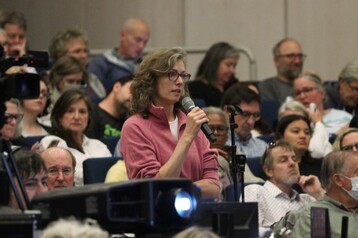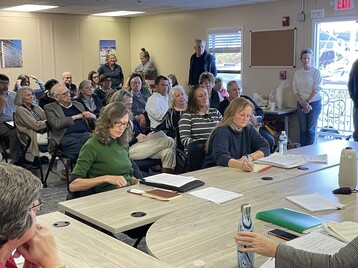"A Dark Day For Nantucket" - Rayport Retains Island Voting Rights After Contentious Challenge
Jason Graziadei •

Who’s allowed to vote on Nantucket?
That was the central question in an unusual public hearing Sunday afternoon when the Board of Registrars voted unanimously to keep Hillary Rayport on the island’s voting rolls. The 3-0 vote rejected a formal complaint filed by island resident Linda Williams challenging Rayport’s eligibility to vote on Nantucket by alleging that she is not a full-time resident of the island.
A standing-room-only crowd gathered in the town’s trailer on Pleasant Street at 3:30 p.m. for the hearing as Williams and Rayport sparred over how much time she spends on Nantucket, whether her water usage records were valid evidence, and what her mortgage documents actually revealed, all while issuing apologies for taking people away from their televisions during the Patriots’ game.
But the case of a year-round island resident challenging the voting eligibility of a part-time resident was a spectacle that drew significant interest and was fueled by local politics, strong personalities, and long-held grudges. But in the end it boiled down to a fundamental question that has recently reared its head in the Cape Cod town of Truro: in a seasonal community with many non-resident taxpayers, who’s allowed to vote?
That question, the registrars discovered, was a difficult one to answer. Massachusetts law does not specify a set number of days required for an individual to live in a city or town to officially qualify to vote there. They were relying on the evidence presented and statements made by Williams and Rayport to determine her residency and eligibility to vote.
The hearing allowed both Williams and Rayport to present opening statements, call on witnesses, and answer questions from the three registrars: Nancy Holmes, Carol Gould and Judith Lipka-Wodynski.

“If we don’t revoke Mrs. Rayport’s eligibility to vote, it will open the floodgates and this is what they’re experiencing over in Truro,” Williams told the registrars, referring to a recent e-mail encouraging second homeowners in Truro to change their voter registration to allow them to vote in the small Cape Cod town. “It seems like wealthy seasonal homeowners registering to vote here to control the regular legal voters is a problem and people are getting fed up with it,”
In her 15-page complaint , Williams submitted documents allegedly showing water usage at Rayport’s property on Main Street, along with tax records, mortgage documents, and other online listings that she said indicate Rayport lives seasonally on Nantucket, with Boston as her primary residence.
“Ms. Rayport has no ties to the community other than a seasonal home, and interfering in how this town operates,” Williams claimed in the complaint. “Illegally registering to vote to further her goals should not be encouraged, and remedial action should be taken immediately to rectify this situation.”
Rayport repeatedly told the registrars that she spends four to five months living on Nantucket, and that the island is the center of her “social and civic life” where she has dedicated time and energy to serving on numerous non-profit boards and town committees. The complaint, she said, was not about any principle or real concern regarding voting eligibility.
“This is about me and my voting rights and my love for Nantucket and where I spend my time and where I have my heart,” Rayport said. “Linda has brought this for political reasons. We disagree about the future of Nantucket and development on Nantucket. The most important rights we have are the rights to free speech and to vote. Linda is trying to take these rights from me.”
Rayport previously led the Nantucket Historical Commission, where she was charged with advising the town on matters of preservation, for three years before being ousted last year by the Select Board. She has ruffled feathers in local government over the past two years by sponsoring a citizen petition to change the makeup and structure of the Nantucket Planning & Economic Development Commission (NP&EDC), a proposal that ultimately passed at Town Meeting by a single vote. A civic-minded preservation advocate to some, while a disruptive manipulator to others, Rayport has become a polarizing figure in town politics.
On Sunday, Rayport called on a handful of her allies in attendance to speak on her behalf, including Kevin Kuester, Tom Montgomery, Georgia Raysman, and Meghan Perry.
“When I first heard about this I was outraged,” Montgomery said. “This should not be happening in this town. It’s not about voter registration or residency, it’s about politics.”
While Williams said most of “her people” were off-island and not present to speak, she did ask Nantucket Association of Real Estate Brokers president Penny Dey to testify in support of her complaint.
“This is about the other 399 voters registered to vote here who don’t live here,” said Dey referring to a number mentioned by Williams that was disputed by town clerk Nancy Holmes. “This is about where she lives and the privilege that comes with that.”
State law regarding voter eligibility for those with multiple residences has been addressed by the Secretary of State's election division. In an advisory that was updated in 2017, Secretary of State William Galvin wrote:
"Although some voters may live in more than one community, they can have only one legal residence," Galvin wrote. "That residence is the place where the facts show they intend to make their home according to the basic principles discussed earlier. It is not true that people who live part of the time in different places may simply pick one of them as their legal residence. Rather, residence is determined by examining all the factual circumstances which indicate where their home actually is. Although the relative amount of time people live in various places is not conclusive, it is an important factor to be considered. It is unlikely that many people will have their homes in a community where they live only during the summer months."
The registrars stated that they required a “preponderance” of evidence in order to support Williams’ complaint, and while they “saw both sides” of the issue, they were not prepared to remove Rayport from the town’s voting rolls based on what they heard on Sunday.
Holmes said that while it appeared Rayport’s time in Boston versus Nantucket was roughly 60/40, “unless there’s a preponderance of evidence, I err on the side of the individual.”
“It doesn’t seem like she’s trying to get away with something,” Gould added.
The 3-0 vote that came at the end of a 3.5-hour meeting can ultimately be appealed to Nantucket Superior Court, an option Williams said she is weighing after the outcome of Sunday’s hearing.
Contacted by the Current shortly after the board’s vote, Nantucket Planning Board member Nat Lowell, a sharp critic of Rayport, said he was disappointed with the outcome and warned against the precedent it could set:
’With this new loose voting criteria based on feelings, we could potentially end up with 20,000-plus registered voters with their primary residence somewhere else,” Lowell said. “We better hurry up and build that indoor sports complex for future town meetings.”
While grateful for what she called the thoughtful consideration of the Board of Registrars, Rayport expressed her displeasure with being singled out by Williams, and the process that she was put through.
“This was a very dark day for Nantucket, a very dark day,” Rayport said after the hearing. “It will never be the same again. She (Linda) said she’s going to spy on people and hunt them down and get them off the rolls. Is she really going to put our beloved town clerk through this? This is about one thing: Linda Williams and Nat Lowell have had an iron grip on planning and land use on Nantucket for the past 20 years…They will do anything to shut up people who oppose them, including trying to take away their right to vote.”
Williams did not say was going spy or hunt people down to determine their voting eligibility during the hearing, and Williams' strenuously objected to Rayport's remarks.
Yet even in defeat, Williams vowed that the issue was not over, and would not rule out submitting a second complaint or filing an appeal with the Superior Court.
“The local people are losing their voice completely,” Williams said. “I took the bullet for everyone. We had just as many if not more in that room on our side to support that effort. They don’t do that (testify) - they came and had silent support. We’re being overrun by people who have their own agenda and don’t listen to the people here and we don’t have a voice anymore. People are working so hard, they don’t have time to get to Town Meeting.”